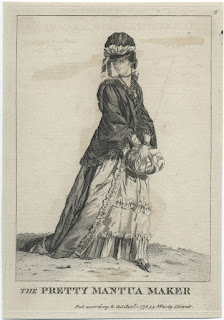Isabella/Susan* reporting:
The following tale of an ingenious, avenging London mantua-maker (dressmaker) saving her young apprentice from a false seducer is from The Spectator (1711), an influential daily publication founded by Joseph Addison and Richard Steele. Most likely these events are pure fiction, not fact, and the "author", the felicitously named Alice Threadneedle, is also likely male. But it could have happened....
It is the ordinary Practice and Business of Life with a Set of idle Fellows about this Town, to write Letters, send Messages, and form Appointments with little raw unthinking Girls, and leave them after Possession of them, without any Mercy, to Shame, Infamy, Poverty, and Disease. Were you to read the nauseous Impertinences which are written on these Occasions, and to see the silly Creatures sighing over them, it could not but be Matter of Mirth as well as Pity.
A little Prentice Girl of mine has been for some time applied to by an Irish Fellow, who dresses very fine, and struts in a laced Coat, and is the Admiration of Seamstresses who are under Age in Town. Ever sine I have had some Knowledge of the Matter, I have debarred my Prentice from Pen, Ink and Paper. But the other Day he bespoke some Cravats of me: I went out of the Shop and left his Mistress to put them into a Band-box in order to be sent to him when his Man called. When I came into the Shop again, I took occasion to send her away, and found in the Bottom of the Box written these Words, "Why would you ruin a harmless Creature that loves you?" then in the Lid, "There is no resisting." I searched a little farther, and found in the rim of the Box, "At Eleven of clock at Night come in an Hackney-Coach at the End of our Street."
This was enough to alarm me; I sent away the things, and took my Measures accordingly. An Hour or two before the appointed Time I examined my young Lady, and found her Trunk stuffed with impertinent Letters, and an old Scroll of Parchment in Latin, which her Lover had sent her as a Settlement of Fifty Pounds a Year. Among other things, there was also the best Lace I had in my Shop to make him a Present for Cravats. I was very glad of this last Circumstance, because I could very conscientiously swear against him that he had enticed my Servant away, and was her Accomplice in robbing me: I procured a Warrant against him accordingly.
Every thing was now prepared, and the tender Hour of Love approaching, I, who had acted for myself in my Youth the same senseless Part, knew how to manage accordingly. Therefore after having locked up my Maid, and not being so much unlike her in Height and Shape, as not to pass for her, I delivered the Bundle designed to be carried off to her Lover's Man, who came with the Signal to receive them. Thus I followed after to the Coach, where when I saw his Master take them in, I cryed out, "Thieves! Thieves!" and the Constable with his Attendants seized my expecting Lover. I kept myself unobserved till I saw the Crowd sufficiently encreased, and then appeared to declare the Goods to be mine; and had the Satisfaction to see my Man of Mode put into the Round-House, with the stolen Wares by him, to be produced in Evidence against him the next Morning.
I have been contented to save my Prentice, and take a Year's Rent of this mortified Lover, not to appear further in the Matter. This was some Penance; but, Sir, is this enough for a Villany of much more pernicious Consequence than the Trifles for which he was to have been indicted? Should not all Men of any Parts or Honour, put things upon so right a Foot, as that such a Rascal should not laugh at the Imputation of what he was really guilty, and dread being accused of that for which he was arrested?....
Above: The pretty mantua maker, published by M. Darly, London, 1772. Lewis Walpole Library, Yale University.
* Why two names? Here's the answer.

No comments:
Post a Comment